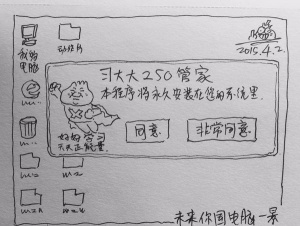“Your country (your China)”的版本间的差异
来自China Digital Space
| 第12行: | 第12行: | ||
<blockquote>'''你国'''作为一个据说有五千年历史的文明古国,现在像样一点的真人秀全部是抄棒子,还好意思嘲笑人家棒子没文化。 ['''[http://weibo.com/2359803624/CpiFfmSkp Chinese]''']</blockquote> | <blockquote>'''你国'''作为一个据说有五千年历史的文明古国,现在像样一点的真人秀全部是抄棒子,还好意思嘲笑人家棒子没文化。 ['''[http://weibo.com/2359803624/CpiFfmSkp Chinese]''']</blockquote> | ||
| − | |||
See also [[expensive country]] and [[kneeling country]]. | See also [[expensive country]] and [[kneeling country]]. | ||
| − | [[Category:Grass-Mud Horse Lexicon]] | + | [[Category:Grass-Mud Horse Lexicon]][[Category:Resistance Discourse]] |
2016年3月14日 (一) 19:32的版本
nǐ guó 你国

Play on "my country" (我国 wǒ guó), a common reference to China.
Calling China "my country" is nothing new or uncommon; Japanese and Korean use the same reference for their respective countries. But netizens have taken to subverting the literal meaning of "my country," as CDT founder Xiao Qiang explains at Foreign Policy:
The phrase has been popping up as a hashtag in posts or embedded as a subversive barb. But Xiao said the term is mostly used by “politically liberal, pro-human rights” and pro-democracy netizens, and that it is deployed against opponents who are “pro-[party], nationalistic netizens.” Xiao said it’s a way to battle the propaganda that assumes a Chinese citizen is a party supporter. In short, it’s a way of saying, “Your China is not my China.” [Source]
Terms like "your country" separate the Chinese Communist Party from the state, which are often conflated in official rhetoric.
@showmethepath: Your country regards itself as an ancient civilization with five thousand years of history, but now all your reality TV shows are copied from the bangzi. And you have the nerve to say the bangzi have no culture. (July 2, 2015)
你国作为一个据说有五千年历史的文明古国,现在像样一点的真人秀全部是抄棒子,还好意思嘲笑人家棒子没文化。 [Chinese]
See also expensive country and kneeling country.




